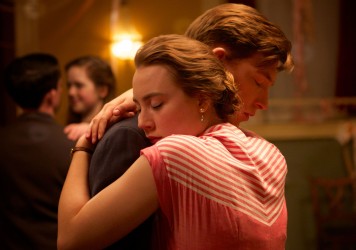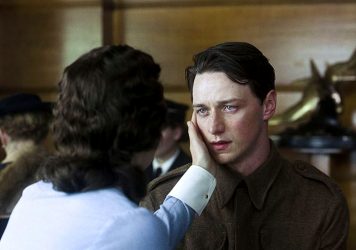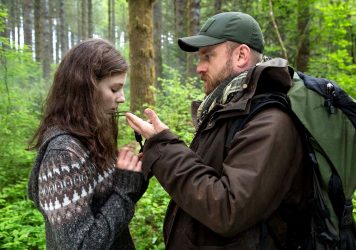Marital woe plagues a young couple honeymooning on the Dorset coast in this Ian McEwan adaptation.
A lot of British comedy cinema from the 1960s was powered by the apocryphal notion that we are a island of prigs, prudes and scardycats when it comes to sex. Rubber-faced Carry On… stalwart Kenneth Williams built a cottage industry out of blanching in horror at anything his comically PC characters would perceive as undue naughtiness. Dominic Cooke’s On Chesil Beach, adapted from a dour novella by Ian McEwan, transforms cultural myth into hard fact, framing the marriage bed as not a venue for bawdy larks, but face-clawing torment.
It’s 1962 and Florence (Saoirse Ronan) and Edward (Billy Howle) are about to get hitched prior to honeymooning at the scenic shingle bank of the title. By rights, the pair should be extremely loved up and excited for the years of lustful frolicking they have ahead of them. In reality, it’s like they’ve both signed a two-way death pact and they’re working out who’s going to chug the poison first.
Even though this is a story about youthful innocence tainted by biological necessity, it is also one which may be tough for modern viewers to comprehend. Sex is framed as a violent invasion of privacy, a disgusting mode of gender-aligned torment, and a vile dance learned through medical pamphlets. Yet the film is not really interested in looking at physical action, instead it is too busy admonishing a postwar generation hung up on pointless tradition.
This is Cooke’s directorial debut, though he arrives to film from a storied and successful career in theatre. During the film’s initial stages, with its bright and unshowy establishing sequences buoyed by much admirably detailed production design, the switch from stage to screen is all but unnoticeable. Yet by the film’s protracted, cosmically overwrought climax, you can almost see the footlights as the actors do their thing. It’s mostly told in flashback, detailing how the happy couple reached this juncture of high anxiety.
The story goes out of its way to emphasise the star-crossed nature of the pairing, and how Edward and Florence through their interests and progressive worldview appear almost made for one another. He is brought up in a tumbledown cottage with a mother (Anne-Marie Duff) suffering from a mental impairment, while she comes from finer stock, with parents who still see marriage an opportunity to expand and conquer. And we all know that a love which defies parental consent is the greatest love of all.
Even though the source material was written by a man, it’s fascinating to think what the story would’ve looked liked had there been a woman behind the tiller. As is, there’s a clear imbalance of empathy towards the worldly but ultimately chivalrous male character at the expense of his more timorous, sensitive female foil. The question at the centre of it all, however, is whether a bond of love can exist without physical consummation.
And this philosophical conundrum is answered in rather abrupt fashion, even though the film appears to quickly undo its own thesis with a soppy, tacked on coda. It’s a shame that the would-be lovers are morally unequal per this story’s insidiously subjective telling, as Edward’s anguish is seen as more deserving of sympathy than Florence’s.
Published 18 May 2018
Saoirse Ronan is in it so we’re there.
Takes a focused, intense and awkward novel and attempts to retool it for mass consumption.
Something of a prestige slog.

Saoirse Ronan is in scintillating form in this lavish period drama from director John Crowley.

By Lena Hanafy
Joe Wright’s World War Two-era romance is a beautiful story of a young couple torn apart by fate.

Debra Granik’s long-awaited follow-up to Winter’s Bone is a hushed masterpiece.